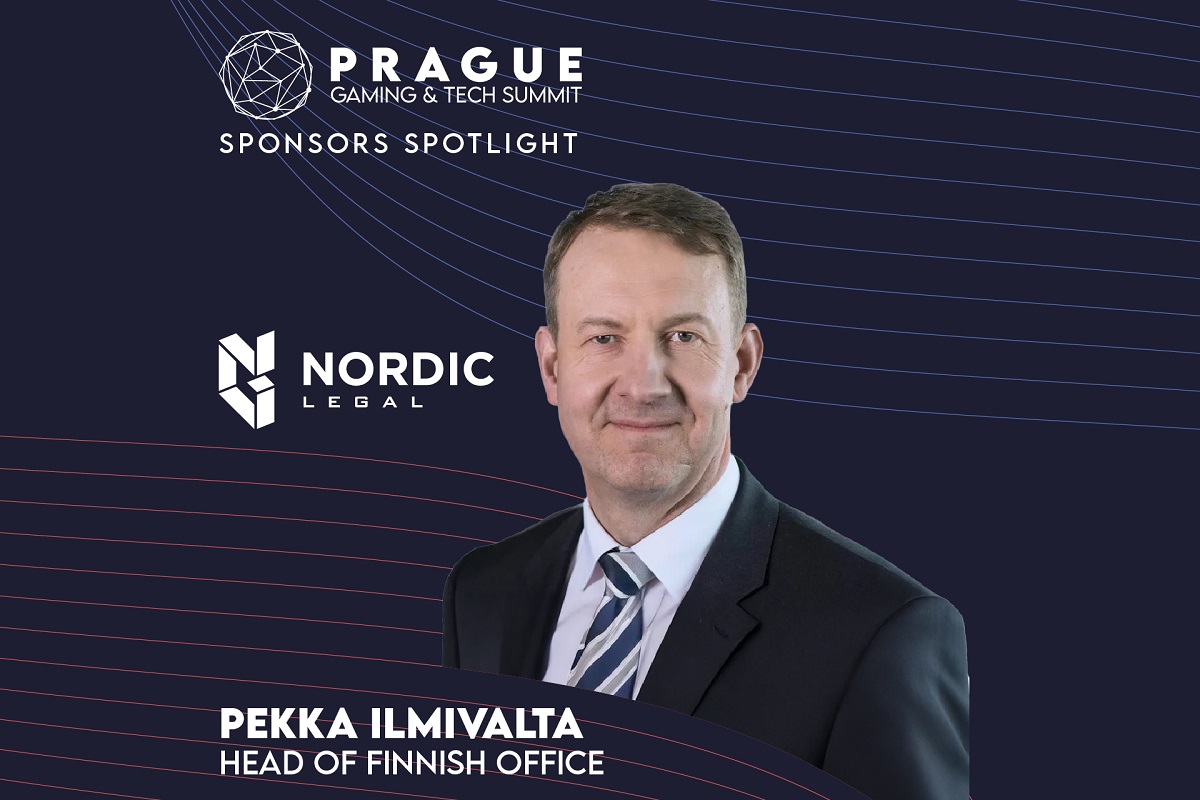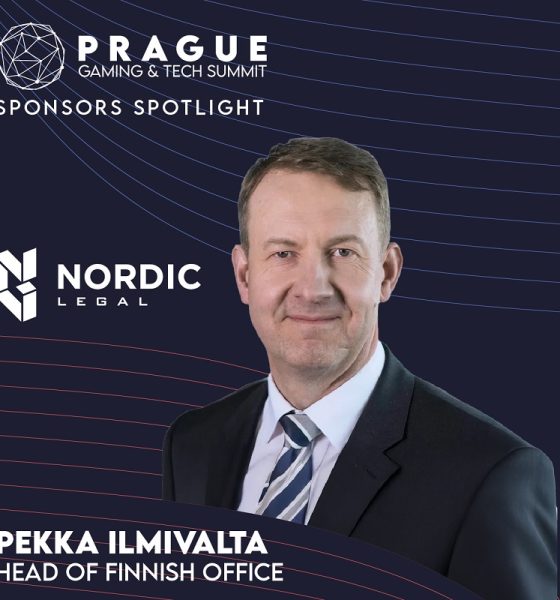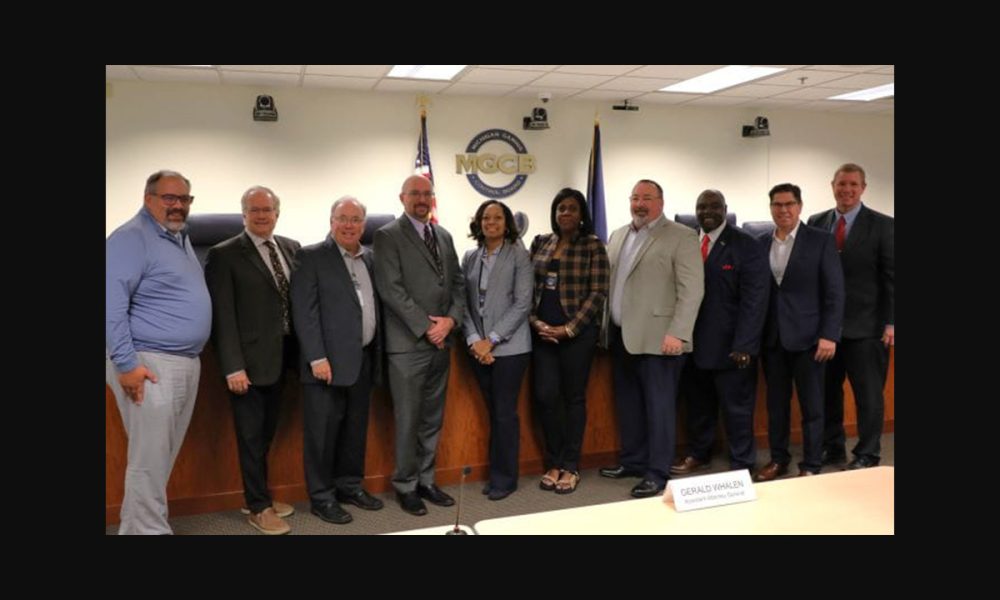

Compliance Updates
Navigating Legal Frontiers: Nordic Legal’s Vision for the Finnish Gambling Market
The Prague Gaming & TECH Summit 2025 brought together top experts across the iGaming and tech landscape, and Nordic Legal stood out as the event’s Scandinavian Legal Expertise Sponsor. A renowned legal advisory firm in the Nordic region, Nordic Legal continues to shape the future of gambling legislation and compliance in Europe.
In this post-event interview, we caught up with Pekka Ilmivalta, Head of the Finnish Office at Nordic Legal, to dive deeper into the firm’s insights on the upcoming Finnish gambling reform, the legal challenges it poses, and the opportunities it presents for operators preparing to enter the market.
Finland is preparing to launch its regulated gambling sector in January 2026. As an expert with over 20 years of experience in the gambling industry, how do you view its draft legislation and the current state of the Finnish gambling market?
Finns are used to gambling online, and the size of the market is close to 2 billion euros in GGR. As the market share of the national monopoly operator, Veikkaus, has declined to around 50 percent, nearly half of the gambling spending already takes place outside the Finnish regulation. Therefore, the gambling legislation reform is really needed.
The Government Proposal now being dealt with in the Finnish Parliament is generally a comprehensive and a good package. As the political parties are quite unanimous about the need for the reform, I expect the parliamentary discussion to concentrate on the balance between responsibility measures and the features making the market interesting enough for the operators to enter the regulated market. Especially marketing, use of affiliates and bonusing will, and should, be discussed.
I believe that the Parliament will approve the new legislation early next autumn and that the B2C license application process will be able to begin already in January next year.
The Finnish legislative review council has raised concerns about potential increases in gambling harms under the new regulatory framework. What measures do you believe are necessary to mitigate these risks, and how could Finland balance market liberalization with responsible gambling practices?
Personally, I think that gambling harms must be taken seriously. However, as almost half of the Finnish gambling now happens outside the regulated market, I am convinced that succeeding in channelization is a crucial starting point to really mitigate gambling harms. Therefore, attractiveness of the market and measures against the black market are extremely important. Furthermore, self-exclusion and responsible gambling tools are, of course, needed for the players. Generally, I believe that AI assisted monitoring could and will have an important role in preventing harmful gambling in the future. To really work, responsible gambling tools need to be both pragmatic and relevant for each individual player.
Considering Finland’s upcoming gambling reform, what legal and operational challenges should gambling operators be prepared for, particularly regarding compliance and player protection? Which key trends do you see shaping the market’s future?
As it seems now that affiliates and welcome bonuses will be banned, operators will have to find other means to build their brand and acquire customers. Even though traditional marketing and sponsoring are widely acceptable, I would expect to see innovative solutions to stand out from the probable marketing avalanche during the first months after the market opening. Perhaps new kinds of sponsorships or retail activities? Or even enhanced player protection measures to gain a competitive edge?
Overall, I would advise operators to start their market entry preparations early enough. The licensing procedure could take several (6 to 9) months. Also, adjusting to the local technical and player protection requirements might not happen overnight.
What insights could help Finland create a balanced and effective gambling market?
I believe that the new legislation will provide a good enough framework for a functional gambling market. However, based on experiences from Sweden and Denmark, I would point out two practical aspects crucial to making the new legislation effective: First, there needs to be collaboration between licensed operators and the new regulator. Dialogue and a mutual will to find solutions should be the common mindset. Secondly, the regulator hopefully has enough resources (tools, persons and persistence) to interfere with the black-market operations, which will evidently still exist also after the reform.
Nordic Legal has extensive experience advising European governments on regulatory best practices. How can your firm assist operators looking to enter the Finnish market and navigate the evolving legal landscape?
With our deep knowledge of Finnish legislation, extensive experience from regulatory developments in other jurisdictions, and strong industry relationships, we are well-positioned to support operators and B2B suppliers entering the Finnish market. We can offer comprehensive guidance not only on compliance and licensing, but also on navigating strategic challenges, ensuring our clients are well-prepared for a dynamic and shifting legal landscape. Our proactive approach enables us to identify regulatory changes early and help clients stay ahead of industry developments.
The post Navigating Legal Frontiers: Nordic Legal’s Vision for the Finnish Gambling Market appeared first on European Gaming Industry News.
Asia
Digital gaming disruption tackled in 1st AsPac Regulators’ Forum

Regulators from across the Asia-Pacific region underscored the need to adapt to digital disruption in the gaming industry during the first-ever Regulators’ Forum held in Manila on Thursday, September 11.
In her keynote address, Philippine Amusement and Gaming Corporation (PAGCOR) President and COO Wilma Eisma said that while gaming jurisdictions across the region vary in size and maturity, they share common challenges such as cross-border transactions, rapid digitalization, and balancing economic benefits with social responsibility.
“In the Philippines, electronic gaming has become a significant growth driver and PAGCOR has responded with initiatives that ensure accountability, security, and consumer protection while allowing the industry to thrive responsibly,” Ms. Eisma said.
However, she said that digitalization, remote gaming, and emerging platforms are testing the limits of traditional oversight models.
“By exchanging best practices, aligning responsible standards, and keeping pace with innovation, we can ensure that the region’s gaming industry grows not just in size but in trust, resilience, and sustainability,” she said.
Ms. Eisma said PAGCOR has introduced reforms such as stricter advertising rules, stronger financial safeguards, and expanded responsible gaming programs but noted that the greater challenge lies in keeping pace with the rapid evolution of online and remote gaming.
The PAGCOR executive also expressed hope that the Regulators’ Forum will become an annual platform for dialogue, with an expanded edition already being planned for 2026.
“I am confident that this Regulators’ Forum will evolve into a hub for knowledge, collaboration and shared commitment,” she said. “Together, let us set the tone for gaming regulation in Asia: one that is innovative, collaborative and firmly anchored on integrity.”
The event was organized by PAGCOR and Inside Asian Gaming (IAG) and hosted by Newport World Resorts. It gathered regulators, operators, and stakeholders from across the region to tackle concerns on player protection and financial integrity, among others.
The post Digital gaming disruption tackled in 1st AsPac Regulators’ Forum appeared first on European Gaming Industry News.
Compliance Updates
MGCB Renews Licenses for Detroit’s Three Commercial Casinos, Highlighting Continued Community and Economic Impact

The Michigan Gaming Control Board (MGCB) unanimously approved license renewals for Detroit’s three commercial casinos—MGM Grand Detroit, MotorCity Casino, and Hollywood Casino at Greektown—during its regularly scheduled public board meeting.
The annual approval follows a comprehensive review of each casino’s operations, regulatory compliance, and commitment to responsible gaming practices, as required under the Michigan Gaming Control and Revenue Act. The decision ensures that Detroit residents and visitors can continue to enjoy a safe, secure, and well-regulated gaming environment.
“Detroit’s commercial casinos are not only entertainment destinations but also major contributors to the city and state economies. By renewing these licenses, the Board reaffirms its commitment to a gaming industry that promotes integrity, accountability, and community benefit. Our oversight helps ensure that patrons have a fair and responsible experience, while Michigan residents continue to see the economic value generated by casino revenues,” said MGCB Executive Director Henry Williams.
The Detroit casinos play a vital role in supporting public services through wagering and sports betting taxes. Licensees are taxed at a rate of 19% on adjusted gross receipts, with 8.1% going to the state and 10.9% to the City of Detroit, along with development agreement payments. Casinos also pay an 8.4% tax on retail sports betting qualified adjusted gross receipts and annual fees that support the state’s regulatory functions. These funds help sustain city services, economic development, and state initiatives.
The MGCB also emphasized the importance of small business participation in the casino supply chain, with measures in place to broaden opportunities for local vendors and suppliers.
Each of Detroit’s three casinos will be eligible for renewal again in September 2026.
The post MGCB Renews Licenses for Detroit’s Three Commercial Casinos, Highlighting Continued Community and Economic Impact appeared first on Gaming and Gambling Industry in the Americas.
Amanda Slonzon VP of Compliance and Regulatory Strategy at RubyPlay
RubyPlay’s US Playbook – Turning compliance into a growth engine

After securing entry into its second US state, and with a third firmly in sight, RubyPlay is sharpening its compliance strategy to balance speed with precision. Amanda Slonzon, VP of Compliance and Regulatory Strategy, explains how the company’s US Playbook is helping to turn regulation into a growth engine, from leveraging New Jersey as a benchmark, to preparing for Pennsylvania’s unique challenges, and building trust-based relationships with regulators and partners across the industry.
When people think about compliance in the US iGaming industry, they often imagine it as the handbrake that slows expansion and stifles innovation. For me, it is the opposite as compliance sits in the driver’s seat. It is not simply a support function but a product in itself that enables us to grow faster, enter new markets with confidence and strengthen our relationships across the industry.
The US online casino market is both highly promising and highly fragmented. Only seven states currently regulate iGaming and each has its own framework. Navigating this landscape requires a deep understanding of both the common threads between states and the subtle differences that can make or break a market entry.
This is why we have developed a US Playbook at RubyPlay, which is a detailed, in-house framework for understanding and applying state-by-state requirements in a way that is tailored to our products and infrastructure. With it, our compliance and regulatory specialists break down each regulation, interpret it in the context of our business, and share that knowledge across the company.
Market comparisons
New Jersey will always be the starting point for most operators and suppliers entering the US. It was the pioneer of state-level regulation and, in many ways, still sets the standard for others to follow. Meeting New Jersey’s requirements ensures a company is well-prepared for other states, many of which recognise its certifications. Delaware, for example, places direct reliance on New Jersey approvals, a pragmatic approach that can streamline entry for those already licensed in the Garden state. But even with these efficiencies, each state demands its own level of preparation and adaptation.
Regulators in the US take compliance very seriously and ensure that every technical aspect of a business meets their requirements. Unlike some EU markets, where providers may not need a B2B license, every US state requires B2B licensing through a thorough, state-specific process. While major shifts are rare, when they occur they can significantly impact the industry. Right now, sweepstakes is the most talked-about development, and with New Jersey’s Governor having recently signed the ban into law, we are seeing a wave of prohibition that will have a major impact across the industry. Our role is to remain attentive, follow changes daily, and ensure we stay as compliant as we intend to be.
Every state also has its own technical standards, licensing requirements, tax structures, and approaches to product approval. For example, Pennsylvania applies the highest tax rate on operators in the country yet remains one of the most attractive among operators. It also has a deeply ingrained gaming culture and a large, active player base. Entering a state like Pennsylvania, which is a key target for RubyPlay in 2026, is not just about passing compliance checks but more about understanding the regulator’s expectations, the market’s economic realities and the cultural context of its players.
Fostering close relationships
One of the most important aspects of operating in the US is the strength of relationships with key stakeholders across the entire ecosystem. I have always believed that a strong relationship with the regulator is just as critical as meeting their requirements on paper. We work to ensure that regulators see us as partners who bring solutions, not problems. We communicate openly and demonstrate that we take their rules as seriously as they do. The same process applies to how we work alongside our industry partners. From platform providers or operator customer, we approach every partnership as a collaborative effort to succeed together.
Culture plays a vital role in how we approach regulation. Compliance is considered a technical discipline, but ultimately it is powered by people who care about getting processes and frameworks robust. I am proud to lead a team that is collaborative and solution-oriented. One of my proudest moments recently came during a recruitment process where I was speaking with a candidate for a role within our compliance team. She told me she had been following RubyPlay closely and was so impressed by our company culture, the pride we take in our work and the way we treat our people, that she was willing to relocate to another country just to join the team. It is a real story that speaks to the environment we have built.
Regulation in the US is not going to advance overnight. The state-by-state approach will remain and evolve, and new product categories will emerge that challenge existing frameworks. My perspective is that the companies who thrive will be the ones who embrace this complexity, invest in understanding it deeply, and treat compliance as a strategic asset rather than an operational hurdle.
The US Playbook we have developed is our way of making that happen. It is an ever-evolving strategy that keeps us compliant, competitive and ready for whatever comes next.
The post RubyPlay’s US Playbook – Turning compliance into a growth engine appeared first on Gaming and Gambling Industry in the Americas.
-

 gaming3 years ago
gaming3 years agoODIN by 4Players: Immersive, state-of-the-art in-game audio launches into the next generation of gaming
-
EEG iGaming Directory9 years ago
iSoftBet continues to grow with new release Forest Mania
-
News8 years ago
Softbroke collaborates with Asia Live Tech for the expansion of the service line in the igaming market
-
News7 years ago
Super Bowl LIII: NFL Fans Can Bet on the #1 Sportsbook Review Site Betting-Super-Bowl.com, Providing Free Unbiased and Trusted News, Picks and Predictions
-
iGaming Industry8 years ago
Rick Meitzler appointed to the Indian Gaming Magazine Advisory Board for 2018
-
News7 years ago
REVEALED: Top eSports players set to earn $3.2 million in 2019
-
iGaming Industry8 years ago
French Senator raises Loot Boxes to France’s Gambling Regulator
-
News7 years ago
Exclusive Interview with Miklos Handa (Founder of the email marketing solutions, “MailMike.net”), speaker at Vienna International Gaming Expo 2018









